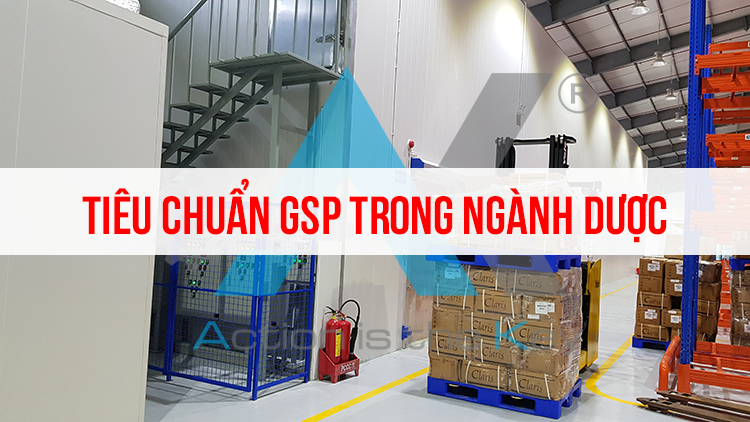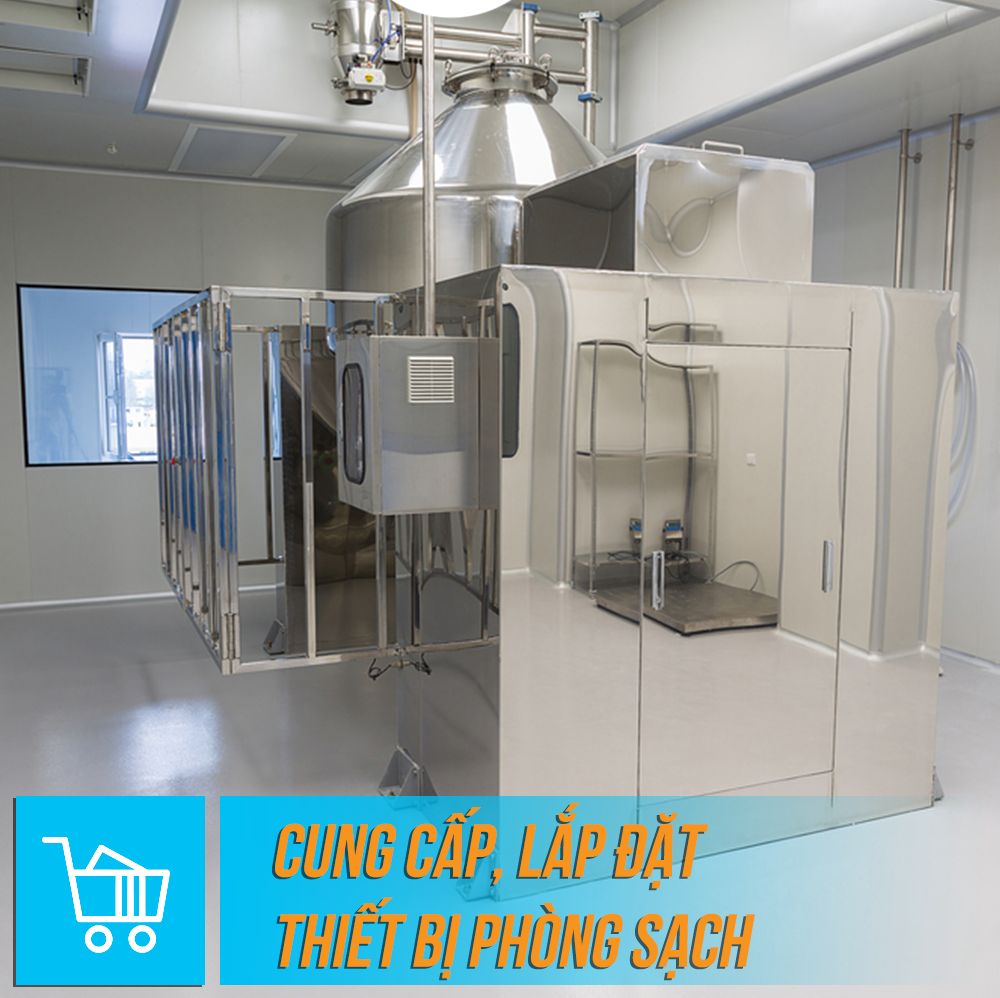What is GSP? The GSP Standard in the Pharmaceutical Industry
09:42 - 17/02/2020 7671
What is GSP? What are the GSP standards in the pharmaceutical industry? And what are the requirements to obtain the GSP certificate?
Cleanroom Light Indicators: Improve Safety & Optimize Processes
Tersicoccus phoenicis: Dormant Bacteria Challenges NASA's Sterile Process
Sustainable Packaging for Cleanrooms: Optimization & Innovation
Vietnam's Amended Pharmacy Law: Important amendments & opportunities for businesses
☰ Article Table of Contents
- 1. Introduction
- 2. Overview of GSP
- 3. GSP Standards: Principles and Application Processes
- 4. Benefits of GSP
- 5. GSP in the Pharmaceutical, Food, and Cosmetics Industries
- 6. GSP Guidelines and Documentation
- 7. Comparing GSP with Other Standards
- 8. Best Practices for Implementing GSP in Enterprises
- 9. Frequently Asked Questions About GSP
- 10. ANH KHANG sincerely looks forward to long-term cooperation with Your Enterprise
Introduction
What is GSP? This is a question that many enterprises, especially those operating in the pharmaceutical, food, and cosmetics industries, are often concerned about. In an increasingly competitive market, ensuring GSP standards not only helps improve product quality but also builds solid trust with customers and regulatory authorities. This article will help Anh Khang and your enterprise clearly understand GSP, from its concept and principles to its implementation process and the benefits it brings.
With a traditional, transparent, and honest working approach, this article is based on accurate and easy-to-understand information, aimed at meeting the informational needs of enterprises in the Cleanroom industry. Through this, Anh Khang hopes to provide valuable knowledge to help your enterprise successfully implement GSP standards in production. In particular, your enterprise can also explore the cleanroom standards to enhance management efficiency.

Overview of GSP
What Does GSP Stand For?
GSP is the abbreviation for Good Storage Practice or Good Supply Practice depending on the industry of application. However, in the context of pharmaceutical and medical product manufacturing, GSP is usually understood as Good Storage Practice – a set of principles and guidelines to ensure that the process of storing and transporting products is carried out according to strict standards.
History and Origin of GSP
The GSP standard was introduced out of the need to ensure the safety and quality of products during storage and distribution. Organizations such as the Vietnamese Ministry of Health, FDA, and international organizations like GMP WHO have contributed their insights in building this standard framework. As a result, GSP is considered an important step in enhancing product quality control from production to the consumer.
GSP Standards: Principles and Application Processes
GSP Principles
The GSP principles include:
- Proper Storage: Ensuring that environmental conditions (temperature, humidity, light) are appropriate for product storage.
- Safe Transportation: Implementing control measures during the transportation of products to avoid damage or quality reduction.
- Strict Process Control: From GSP evaluation, GSP inspection to employee training, everything is aimed at ensuring that products meet the highest standards.
- Compliance with Regulatory Requirements: Monitoring and adhering to the regulations of the Vietnamese Ministry of Health as well as international standards like ISO 22716.
GSP Implementation Process
The process of implementing GSP in an enterprise typically includes the following steps:
Assessment of the Current Situation
- Conduct inspections and assessments of storage facilities, transportation systems, and product preservation processes.
- Identify areas for improvement to comply with GSP standards.
Developing GSP Documentation
- Draft documents and GSP records that describe the processes, principles, and standards applied.
- GSP documentation should be organized, easy to reference, and track.
Employee Training
- Organize GSP training courses to help employees fully understand the GSP principles and how to apply them in their daily work.
- GSP training should not only focus on knowledge but also on practical application and periodic testing.
GSP Evaluation and Inspection
- After the preparatory steps, the enterprise will undergo GSP evaluation by competent authorities or reputable organizations.
- Periodic GSP inspections are conducted to ensure that all processes consistently meet the standards.
GSP Certification
- When the enterprise fully meets the requirements, it will be granted the GSP certificate.
- The GSP certificate is a testament to the quality of products and storage processes, thereby building trust with customers and partners.
The cost of GSP certification depends on the scale, structure, and complexity of the enterprise. Typically, this cost includes:
- GSP training costs for employees.
- Costs for drafting and maintaining GSP documentation.
- Fees for evaluation and inspections by the relevant authorities.
Please contact the certification organizations directly to receive a detailed quote that suits your enterprise's scale.

Benefits of GSP
Implementing GSP standards brings many practical benefits to your enterprise:
- Enhanced Product Quality: Ensures that products are stored and transported properly, minimizing the risk of damage.
- Increased Customer Trust: Products certified under GSP are seen as safe and high quality, thereby building strong trust.
- Support for Legal Compliance: Helps enterprises meet the requirements of the Vietnamese Ministry of Health and other regulatory bodies.
- Reduced Loss Costs: Effective control over storage and transportation processes minimizes expenses related to product damage.
- Increased Market Competitiveness: Products that meet GSP standards have an advantage in penetrating international markets and satisfying strict customer criteria.
GSP in the Pharmaceutical, Food, and Cosmetics Industries
GSP in Pharmaceuticals
In the pharmaceutical industry, GSP helps ensure that medicinal products are stored according to regulations, ensuring their effectiveness and safety for users. Standards such as GMP WHO and good pharmaceutical manufacturing practices are also closely related to GSP. Implementing GSP in pharmaceuticals not only guarantees quality but also supports enterprises during GSP evaluations and periodic GSP inspections.
To optimize this process, your enterprise can refer to pharmaceutical cleanroom construction consulting.
In addition, investing in cleanroom equipment for the pharmaceutical industry also contributes to enhancing production efficiency.
GSP in Food
For the food industry, GSP is an essential part of ensuring that products do not become contaminated or spoiled during storage and transportation. Enterprises need to conduct GSP training for employees and strictly follow guidelines to ensure that food meets safety standards, thereby building consumer trust.
At the same time, implementing cleanroom applications in the food industry also helps ensure product quality.
GSP in Cosmetics
The cosmetics industry is no exception when it comes to applying GSP standards. Cosmetics stored under GSP will have consistent durability and quality, ensuring safety for consumers. Enterprises should pay attention to developing GSP documentation and conducting periodic GSP inspections to maintain product quality.
GSP Guidelines and Documentation
To successfully implement GSP standards, your enterprise should refer to official guidelines and documents from regulatory bodies such as the Vietnamese Ministry of Health, FDA, and international standards like ISO 22716. Some steps to follow include:
- Collecting Documentation: Research and archive GSP guideline documents from reputable sources.
- Participating in GSP Training Courses: Enroll in specialized GSP courses to enhance the knowledge of management teams and staff.
- Practical Application: Implement GSP processes in actual production, storage, and transportation.
- Evaluation and Improvement: Regularly assess processes and implement necessary improvements to ensure continuous compliance with GSP standards.
Comparing GSP with Other Standards
The Difference Between GMP and GSP
GMP (Good Manufacturing Practice) focuses on the production process to ensure quality from manufacturing to packaging.
GSP focuses on the storage, transportation, and warehousing processes. Both standards play important and complementary roles. While GMP ensures quality from the input to the final product, GSP helps maintain that quality throughout the entire supply chain.
For more details, your enterprise can refer to cleanroom GMP standards for healthcare.
ISO 22716 and Related Standards
The ISO 22716 standard is widely applied in the cosmetics industry, providing detailed guidelines on production processes and quality control. When implementing GSP, enterprises should consider aspects of ISO 22716 to ensure that storage and transportation processes are also executed according to international standards.
The Roles of the FDA and the Vietnamese Ministry of Health
Both the FDA and the Vietnamese Ministry of Health set strict requirements for the storage and transportation of products in the pharmaceutical, food, and cosmetics industries. Therefore, complying with the regulations of these agencies is mandatory when implementing GSP. This not only helps enterprises adhere to the law but also enhances their reputation and product quality in the market.
Best Practices for Implementing GSP in Enterprises
To effectively implement GSP, your enterprise should take the following steps:
- Define the Scope of Application: Select specific stages in the production and transportation process where GSP will be applied.
- Clearly Assign Responsibilities: Each department within the enterprise should have specific responsibilities in implementing and monitoring GSP principles.
- Utilize Supporting Technology: Employ warehouse management, transportation, and quality control software to enhance the efficiency of GSP.
- Regularly Review and Improve: Periodically evaluate the GSP processes and implement necessary improvements to continuously maintain safety and quality standards.
Frequently Asked Questions About GSP
Below are some frequently asked questions to help Anh Khang and your enterprise better understand GSP:
Is GSP mandatory?
For industries related to health and consumer safety, GSP is a mandatory standard according to legal regulations and international organizations.
How does GSP affect product quality?
Implementing GSP helps maintain product quality from storage and transportation until it reaches the customer, thereby ensuring effectiveness and safety.
How many principles does GSP have?
The principles of GSP can be clearly divided according to each process from storage to transportation, while also coordinating with related standards such as GMP and ISO 22716.
What is the GSP implementation process?
The GSP implementation process includes assessing the current situation, developing GSP documentation, training, evaluation, and certification, along with periodic inspections.
What is the cost of GSP certification?
This cost depends on the scale and complexity of the enterprise, so it is advisable to obtain quotes from reputable certification organizations.
ANH KHANG sincerely looks forward to long-term cooperation with Your Enterprise
Implementing the GSP standard is an important step for your enterprise, especially in the Cleanroom industry. Proper implementation of GSP processes not only ensures product quality but also helps enterprises comply with legal regulations, building solid trust with customers and partners.
In summary, GSP is a key factor in maintaining and improving product quality. From its concept to the implementation process, and from the benefits to the comparisons with other standards such as GMP and ISO 22716, every aspect is directed towards ensuring product safety and quality. If your enterprise needs further consultation or support in implementing GSP standards, Anh Khang is always ready to accompany and share practical experiences.
Your enterprise, please contact Anh Khang today to receive detailed consultation and learn how to effectively apply GSP standards, helping your enterprise not only meet the standards but also achieve sustainable growth in today's fiercely competitive market.
 | Anh Khang Cleanroom Electromechanical Joint Stock Company Hotline: 1900 636 814 Email: info@akme.com.vn Website: akme.com.vn Address: Lot B7 Xuan Phuong Garden, Trinh Van Bo Street, Phuong Canh Ward, Nam Tu Liem District, Hanoi. |
12:05 - 28/11/2019 47858
Cleanroom Design and Construction
14:05 - 11/03/2025 22339
GMP and ISO Standard Cleanroom Construction
14:18 - 11/03/2025 12301
ISO Standard Medical Cleanroom Construction
14:13 - 28/02/2025 23455
Electronics Cleanroom Construction
16:15 - 18/03/2021 5969
Warranty Service
16:26 - 28/11/2019 18803
Supply and installation of cleanroom equipment
14:50 - 26/11/2019 6207
Technology Production Line Consulting
16:35 - 19/03/2025 19468














